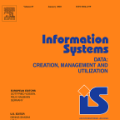Cloud computing has made federated database systems (FDBS) significantly more practical to implement than in the past. As part of a recent Web-based Geographic Information System (WebGIS) project, we are employing cloud-native technologies (from the container ecosystem) to develop a federated database (DB) infrastructure, to help manage and utilise the distributed and various geospatial data. Unfortunately, there seem to be inherent challenges and complexity of applying the container and Kubernetes technologies to building and running DB systems. Considering that most of the geospatial and theme data are pre-obtained and fixed in our WebGIS project, we decided to focus on the read-only user queries and still resort to Kubernetes to implement an FDBS instance to use. Unlike the de facto practices (e.g., using the StatefulSets mechanism, extending Kuberentes APIs, or employing KubeFed), our solution for Kubernetes-aided FDBS simplifies the tech stack by investigating the fractal object of federated data management, inclusively containerising DB instances, and using the lightweight Deployment mechanism to handle stateless DB containers. Overall, this research not only reveals an easy-to-implement approach to constructing read-only components in a fully-fledged FDBS, but also proposes and demonstrates a novel methodology for FDBS investigations.
翻译:云计算使得联盟式数据库系统(FDBS)比过去更便于实施。作为最近基于网络的地理信息系统项目的一部分,我们正在利用云端技术(来自集装箱生态系统)开发一个联合数据库基础设施(DB),帮助管理和利用分布式和各种地理空间数据。不幸的是,在将集装箱和库伯涅茨技术应用于建立和运行DB系统时,似乎存在着内在的挑战和复杂性。考虑到大部分地理空间和主题数据都是在我们的网络地理信息系统项目中事先获得和固定的,我们决定把重点放在只读用户查询上,并仍然利用库伯涅斯来实施FDBS实例。与事实上的做法不同(例如,利用国有数据库机制,扩展库伯连特和各种地理空间数据数据库,或使用库贝菲德),我们对Kubernetes辅助的FBDBS的解决方案通过调查联邦化数据管理的碎形物体、包容性集装箱化DB实例,以及利用库贝奈特网络实施FDBS实例,并使用简易的FDB研究系统系统系统,同时在完整地向数据库展示一个数据库展示工具,并完整地展示一个数据库中进行DB系统。



